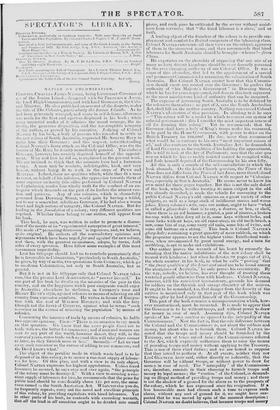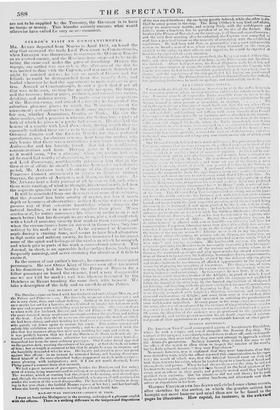NAPIER ON COLONIZATION.
COLONEL. CHAR I.ES JAMES NAPIER, twill:: Lietaellalll-GOVeTrIOT of 1'.• of the Ionian Island,,, disagrecl vBth Sir FREDERICK Aryl, Iii.. 1.01(1 High Commissioner, and with Lord GoDERIcIi, the Colo- nial NI Mister. 1 le aL o published an account of the dispute, under the title of The Colonies, particularly the Ionian Islands. As he Lad been grievously wronged, and wrote ill self. defence, allowance was made for the heat and egoti.iin displayed in his bunk; while every impartial reader of it admires the moral courage, the in- dustry, the generous disposition. and the incorruptible integrity
lie author, as proved by his narrative. Judging of Colonel
.'hilt by his book, a body of persons who intended to settle in the new colony of South Australia, requested Mr. SPRING RICE ID Itiako him their Governor: and this request, notwithstanding :,,nel NA PIER'S fierce attack on the Colonial Mice, was (to the ...,uoar of Mr. RICE be it said) immediately granted. The embrt o Governor, however, has recently deprived himself of the appoint- ment. IV Itv and how he did so, is explained in the present work. We are inclined to think that the colonists have had a fortunate e,cape. A man may be resolute, indefatigable, kind, and very holiest, without being fit to walk in the steps of PENN and R...I.TLES. 1 deed, there are qualities which, while they tit a man to resist, on behalf of his inferiors, the oppression towards them of some superior authority (the (Alice performed try Colonel NAPIER in Cephalonia), render him wholly unfit for the conduct of an en- terprise which demands on the part of its leaders the utmost cau- tion and patience. Aay of our colonies, which is shamefully governed from Downing Street, would gain by having a wilful, not to say a somewhat rebellious Governor, if he had also a warm heart and high notions of integrity, like Colonel NAPIER. But for leading in the foundation of a colony, very different qualities are required. Whether these belong to our author, will appear from his book.
This bock, he says, was written in order to promote a discus- sion of the merits of an "experimental enterprise of great interest." His mode of" promoting discussion" is ingenious, and, we believe, quite original. Ile collects all the contradictory opinions and arguments which have been urged for and against the new colony, and then, with the greatest earnestness, adopts, by turns, Loth sides of every question. Here follow some examples of this most uncommon impartiality.
Lest his titlepage should lead us to conclude prematurely that he is favourable to Colonization, "particularly in South Australia," he gives, by way of motto, two quotations from CORBETT, which go to condemn Colonization, not oily in South Australia, but in general.
But it is net in his titlepage only that Colonel NAPIER takes care, like the present Lord A,,IIBURTON, to " answer himself:" In one part of his book he dwells on the miseries of the poor in this country, and on the happiness which poor emigrants would enjoy in Australia; elsewhere he declaims, in CORBETT'S tone and HENRY Hu NT'S style, against colonies as means of relieving an old country from excessive numbers. Ile writes in favour of Emigra- tion with the zeal of WIL3IOT HORTON ; and with the fury (though not the force) of CORBETT, against what he terms "such nonsense as the excuse of relieving the population" by means of colonies.
Concerning the increase of trade by means of colonies, he holds two oppcsite opinions. First—" There is no occasion to say much on this question. We know that the more people there are to trade with us, the better fer commerce; and if men and women are colt to any part of the world, however desert, they will, in the coursed years, cause trade Wii us; and this will take place sooner or later, as they flourish more or less." Secondly—" Let us cast away such nonsense as the excuse of adding to our commerce, and the Devil knows what."
The object of the peculiar mode in which waste land is to be disposed of in this colony, is to secure a constant supply of labour-
s for hire. Of this plan, and with a view to its only object, Colonel NAPIER expresses his highest approbation. Unless hired
labourers be secured, he says over and over again, "the principle
of the colony must be destroyed." With a view to securing a con- stant supply of labourers for hire, he recommends that the price for
public land should be cons:derably above 12s. per acre, the mini- num named the South Austiahan Act. Whateverelse you do, lie frequently repeats, carry out the novel and excellent principle of this colony, by providing capitalists with hired labourers. Yet in other parts of his book, he contends with exceeding warmth, that all the land in all countries ought to be divided into small pieces, and each piece be cultivated by the owner without assist- anee from servants; that " the hired labourer is a slave," and so forth.
A leading object of the Plunders of the colony is to provide em- ployment and comfort for British emigrants of the labouring class. (Monet NAPIER enters into all their views on the subject, approves of them in the stroneest terms, and then recotntnends that hired labourers for South Australia should be brought—whence? —frons.
China.
He expatiates on the absurdity of suppo-ing that any one of so many as flirty distant 161114(10ms should be men decently governed by the ever-changing authority of our Colonial 011iee. It was a sense of this absordity, that led to the appointment of a special and permanent Commissien for managing, the colonization of South Australia. But Colonel NAPIER cannot bear that this Commis- sion should exert any control over the Governor : he prefers the authority of " his Majesty's Government " in Downing Street.. which he has for years represented, and does in this book represent as the most mischievous kind of authority that can be imagined.
The expense of governing South Australia is to be defrayed by the colonists themselves : lie part of it, says the South Australian Act, shall 611 on the mother country. Nothing can exceed Colonel NAPIER'S admiration of this provision. In alluding to it he says —"This colony will be a model by which to correct our system of colonial government : this I consider the most important reason of all for forming this colony." Yet he recommends that the Governor shall have a body of King's troops under his command, to be paid by the Home Geernment, with power to draw on the British Treasury for 100,000/. He doe:, more than recommend what would be so contrary to his own "most important reason of all," and also contrary to the South Australian Act : he demands it of Lord GLENELO as the condition of his holding the appointment. He is told to look at the Act of Parliament; sees that the sine qua non on which lie has S.) rashly insisted cannot be complied with; and finds himself deprived of the Governorship by his own folly.
All this is only a sample of the self-contradicticm in which the book abounds. On the Irish Church qoestion, the Times of this June does not differ from the Times of last June, more than Colonel NAPIER differs from Colonel NAPIER With respect to "Coloniza- tion, especially in South Australia." He seems never to know his own mind for three pages together. But this is not the only defect of the book, which, besides treating its main subject in the odd. way already described, is made the vehicle for conveying to the public Colonel NAPIER 'S odd opinions on a great variety of other subjects, as well as a large stock of hula:rent stories and worse jokes. Every colonist's wife, says our author, ought to have "what_ is called a ,glory -hole; that is to say, a drawer, or box, or shelf, where there is an old hammer, a gimlet, a pair of pincers, a broken tea-cup with a little dirty oil in it, sonic keys without locks, and some locks without keys, an old razor-strop, an old tooth-brush, a saw, some bits of rag, some rusty old nails, some bits of twine, and some old buttons on a string." This book is Colonel NAPIER'S glory-hole; containing a great quantity of mere rubbish, on which the proprietor appears to set the highest value. Intellectual weak- ness, when accompanied by great moral energy, and a turn for scribbling, is apt to make sad exhibitions. Our author proves the warmth of his heart by earnestly de- manding that the native inhabitants of the new colony shall be treated with kindness : but when he devotes 90 pages out of 213, the whole number in his book, to what he calls " proving " that thefinest qualities of the hear! and mind are to be found among the aborigines of Australia," he only prove; his eccentricity. By rho way, nobody, we believe, has ever thought of treating these wretched people otherwise than with kindness.. Colonel NAPIER, however, with his consistent inconsistency, grounds his demand for soldiers on the thievish and savage character of the natives. It ought to be remarked, too, that danger front the ferocity of the natives is mentioned only in that part of the book which was written after lie had deprived himself of the Governorship.
This part of the book contains a misrepresentation which, how- ever unintentional, must be corrected. It is made to appear that
the Governor is to be without troops, and without power to draw for money in case of need. Assuming this, Colonel NAPIER speaks of his " own caution as opposed to the intrepidity of the
Commissioners." Now the fact is, that the sole difference between the Colonel and the Cuminissioners is. not about the soldiers and
money, but about who is to furnish them. Colonel NAPIER in-
sisted that the troops and money should be furnished by the Treasury, out of taxes raised here : the Commissioners referred to the Act, which expressly authorizes them to raise the means
of providing troops and money without applying to the Treasury. This is one of their chief duties; and we are bound to suppose
that they intend to perform it. At all events, neither they nor
Lord GLENELG have said, either directly or indirectly, that the Governor will be w about troops, or without power to draw for money in case of need. The " intrepidity " of the Commission-
ers, therefore, consists in their choosing to furnish troops and money by legal means; the "caution" of the Colonel, in demand-
ing an illegal method of providing troops and money ; and there is not the shadoW of a ground for the alarm as to the prospects of the colony, which he has expressed since his resignation. If a less honourable man had chosen such a time to express such alarm, without any sort of ground for it, we might have sus- pected that he was moved by spite of the meanest description ; Colonel NAPIER no doubt believes, that because troops and money are not to be supplied by the Treasury, the Governor is to have no troops or money. This blunder entirely excuses what would otherwise have called fo. very set ere comment.



























 Previous page
Previous page